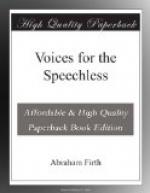COWPER.
* * * * *
LEARN FROM THE CREATURES.
See him from Nature, rising
slow to Art!
To copy Instinct, that was
Reason’s part;
Thus then to man the voice
of Nature spake:—
“Go, from the creatures
thy instructions take;
Learn from the birds what
food the thickets yield;
Learn from the beasts the
physic of the field;
Thy arts of building from
the bee receive;
Learn of the mole to plough,
the worm to weave;
Learn of the little nautilus
to sail,
Spread the thin oar, and catch
the driving gale.
Here, too, all forms of social
union find,
And hence let reason, late,
instruct mankind:
Here subterranean works and
cities see;
There towns aerial on the
waving tree.
Learn each small people’s
genius, policies,
The Ant’s republic,
and the realm of Bees:
How those in common all their
wealth bestow,
And Anarchy without confusion
know;
And these forever, though
a monarch reign,
Their sep’rate cells
and properties maintain.
Mark what unvaryed laws preserve
each state,
Laws wise as Nature, and as
fixed as Fate.
In fine, thy Reason finer
webs shall draw,
Entangle Justice in her net
of Law,
And Right, too rigid, harden
into Wrong;
Still for the strong too weak,
the weak too strong.
Yet go! and thus o’er
all the creatures sway,
Thus let the wiser make the
rest obey;
And, for those Arts mere Instinct
could afford,
Be crowned as Monarchs, or
as God adored.”
POPE.
* * * * *
PAIN TO ANIMALS.
Granted that any practice causes more pain to animals than it gives pleasure to man; is that practice moral or immoral? And if exactly in proportion as human beings raise their heads out of the slough of selfishness, they do not answer “immoral,” let the morality of the principle of utility be forever condemned.
JOHN STUART MILL.
* * * * *
WHAT MIGHT HAVE BEEN.
It might have been that the
sky was green, and the grass serenely blue;
It might have been that grapes
on thorns and figs on thistles grew;
It might have been that rainbows
gleamed before the showers came;
It might have been that lambs
were fierce and bears and tigers tame;
It might have been that cold
would melt and summer heat would freeze;
It might have been that ships
at sea would sail against the breeze—
And there may be worlds unknown,
dear, where we would find the change
From all that we have seen
or heard, to others just as strange—
But it never could be wise,
dear, in haste to act or speak;
It never could be noble to
harm the poor and weak;
It never could be kind, dear,
to give a needless pain;
It never could be honest,
dear, to sin for greed or gain;
And there could not be a world,
dear, while God is true above,
Where right and wrong were
governed by any law but love.




